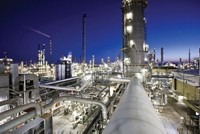Advertisement
Grab your lab coat. Let's get started
Welcome!
Welcome!
Create an account below to get 6 C&EN articles per month, receive newsletters and more - all free.
It seems this is your first time logging in online. Please enter the following information to continue.
As an ACS member you automatically get access to this site. All we need is few more details to create your reading experience.
Not you? Sign in with a different account.
Not you? Sign in with a different account.
ERROR 1
ERROR 1
ERROR 2
ERROR 2
ERROR 2
ERROR 2
ERROR 2
Password and Confirm password must match.
If you have an ACS member number, please enter it here so we can link this account to your membership. (optional)
ERROR 2
ACS values your privacy. By submitting your information, you are gaining access to C&EN and subscribing to our weekly newsletter. We use the information you provide to make your reading experience better, and we will never sell your data to third party members.
Business
Europe’s Energy Costs
Citing diminished competitiveness, chemical industry begins a push to explore shale gas in the EU
by Alex Scott
June 3, 2013
| A version of this story appeared in
Volume 91, Issue 22
For decades, the Middle East has had it. North America has just gotten hold of it again. And now Europe needs it: cheap energy. If the region doesn’t find an inexpensive source soon, it will fail to compete globally, Europe’s business leaders say. Among those surveyed by Accenture, a consulting firm, 58% are pessimistic that industry in the European Union will in three years’ time be cost-competitive from an energy perspective.
The chemical industry is sending a similar message. “Further unilateral increases in EU energy costs would make many basic chemicals made in the EU uncompetitive, with knock-on effects down the whole value chain,” Kurt Bock, chairman of chemical maker BASF and head of Europe’s main chemical trade association, stated recently in a letter to European Council President Herman Van Rompuy.
Bock’s proposed solutions include the exploitation of shale gas deposits in Europe and more consistent energy policies across the region. The conundrum for Europe is that views differ widely on whether companies should drill for the Continent’s shale gas holdings.
The U.K. government is allowing shale gas exploration. In contrast, France has a moratorium on shale gas drilling. European Energy Commissioner Günther Oettinger recently disclosed that the EU energy department will explore extraction of shale gas supplies.
The pressure is on to find a solution. Natural gas prices for industry are up to five times as high in much of Europe as they are in the U.S., according to the Accenture study, and new business opportunities may be slipping away. Carmaker BMW cites Europe’s high energy prices as contributing to its recent decision to build a $100 million carbon fiber plant in the U.S. rather than the EU.




Join the conversation
Contact the reporter
Submit a Letter to the Editor for publication
Engage with us on Twitter